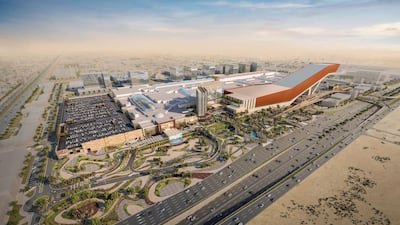The increasing number of women entering Saudi Arabia's workforce is one of a number of fundamental factors encouraging Dubai-based Majid Al Futtaim to make more investments in the kingdom, its chief executive said.
Last week, the Dubai-based group appointed Aecom as lead consultant on its 16 billion Saudi riyals ($4.26bn) Mall of Saudi project and opened its first artificial intelligence-enabled, fully automated fulfilment centre in the kingdom’s commercial capital, Jeddah, as part of a series of ongoing investments in the market.
"As you know, women now are working and their integration in the workforce is happening in a very good way. This will have a major impact on household income in Saudi Arabia," Alain Bejjani, Majid Al Futtaim Holding chief executive told The National.
"Saudi Arabia used to have a relatively modest household income because you had just one bread-earner with large families," he added. "With better gender equality, we will see the Saudi economy develop and … consumption contributing a much higher share of GDP".
MAF, which is the Middle East's largest mall operator, first announced plans for Mall of Saudi, which is being built in the north of Riyadh, in February 2016. The project will house the Middle East’s biggest indoor ski slope and snow park as well as 600 shops over 300,000 square metres of leasable mall space. It also includes nine hotels and serviced apartments.
It has gone through four years of design and approvals, which is typical for a project of this size, Mr Bejjani said. There have also been some delays due to Covid-19, but this was not due to commercial considerations, he added.
"All kinds of project of this nature, given the lead time to bring to life, you typically go through at least one economic cycle," he said.
Mr Bejjani said a contractor would be appointed "in the coming months" to allow enough time for mobilisation before a start on site is expected in November.
There have been significant changes to the kingdom’s economic landscape since the project began. For instance, cinemas reopened in 2018 and the Mall of Saudi contains a 31-screen Vox Cinema and a Magic Planet family entertainment centre.
"Saudi Arabia is opening more and more, we are going to see more tourists coming in and we are going to see the positive impact of the reforms that the Saudi government has put in place," Mr Bejjani said.
MAF currently employs about 5,000 staff in the kingdom through its Carrefour supermarkets, Vox cinemas and its Enova facilities management business. The new mall project will create about 70,000 jobs during the construction phase and 16,000 once complete, the company said last week.
"It’s a major undertaking of about 16bn riyals and this can only happen in an economy that has the fundamentals that Saudi Arabia has today."
The world's largest oil exporter has the biggest economy in the Arab world. Last month, its non-oil economy grew at its fastest rate since January, with the Purchasing Managers Index standing at 56.2 in May, considerably higher than the neutral 50 reading that separates economic expansion from contraction.
Consumer spending is also robust, with Saudi Central Bank data for April showing a 142 per cent year-on-year increase in point-of-sale transactions compared with April last year when the pandemic was at its height.
MAF plans other investments, including the strengthening of its distribution network across the kingdom to support e-commerce growth, which has picked up amid the pandemic, Mr Bejjani said.
There has been "a major change" in terms of the mindset of officials in the kingdom towards foreign investment, with government bodies looking to cut red tape and facilitate projects, he said.
"I have to say that Saudi Arabia has moved a lot in the last few years ... in terms of business friendliness," he said.
"We’ve seen that with my meetings ... with officials, with the ministry of investment, with all of the giga-projects that the different government entities and companies are trying to bring to life as fast as possible."


